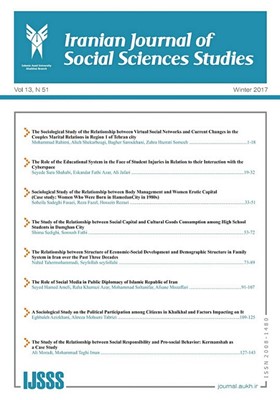Transformations Of Policy Institution In Iran From Dissolution Of Reza Shah Tyranny Until the Beginning Of The Dictatorship Of Mohammad Reza Shah (1941-1953)
Subject Areas : Family
Akhtar Shiri
1
![]() ,
Hosein A.Tanhaei
2
*
,
Tahmures Shiri
3
,
Hosein A.Tanhaei
2
*
,
Tahmures Shiri
3
![]()
1 - PhD Student in Sociology, Central Tehran Branch, Islamic Azad University, Tehran, Iran
2 - Associate Professor, Department of Sociology, Central Tehran Branch, Islamic Azad University, Tehran, Iran
3 - Associate Professor, Department of Sociology, Central Tehran Branch, Islamic Azad University, Tehran, Iran
Keywords: Political System, parliament, Abduction, Dialectics, Elementary Analysis,
Abstract :
Aim of this article is study the changes in the political system after the withdrawal of Reza Shah to the establishment of the dictatorship of Mohammad Reza Shah. Since studies in the field of Iranian social history are based on the narrations of historians and published documents, but oral history, which speaks of historical events, has been ignored. In this research, data gathered from interviews conducted in the early 1980's with grassroots and Pahlavian politicians. The research approach is based on Abduction and avoids the application of the theoretical framework due to the role of specialism and historical relativity in the field of historical sociology, which leads to a deductive approach. The results, which were obtained by elementary analysis, showed that at the beginning of the reign of Mohammad-Reza Shah, Iran was political instability and parliament, parties and the press, along with the government's cabinet have important roles in making political decision. The relations of these elements were based on supplementary dialectics and with the Shah based on compensatory dialectics and sought to utilize the opportunities available to compensate for lost opportunities during the Reza Shah era; the only presence of the Toudeh party in this period was different with other Social forces. The Toudeh party, also active in the Reza Shah era, continued actions during this period, but was kept away from the official presence of politics because of opposition to the monarchy.
_||_

